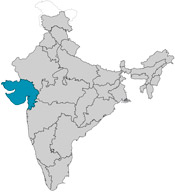
Meet three beautiful women living in rural villages of Gujarat, India — Manisha, Geeta, and Mumtaj. They each met certain requirements that ultimately led to their inclusion here:
- Their family was living below the poverty line — India’s current BPL is Rs. 27,000, or, at the time of this writing, approximately US$415 per year.
- They were marginalized and in need of help.
Manisha
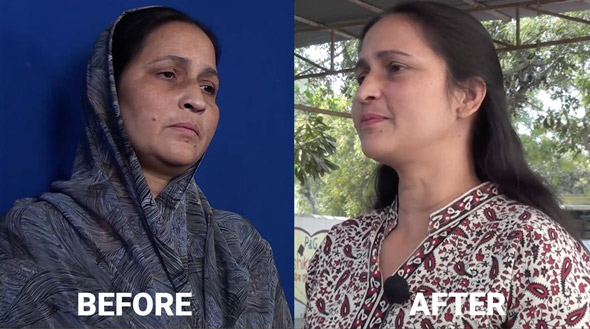
Manisha Patel used to work with her husband on a farm in the rural town of Dholka. However, after his unexpected death, she found herself deserted and unable to support her family. With help through the Enhanced Livelihood Project from Share & Care and our NGO partner, Project Life, she joined computer classes and eventually got a job as a computer operator at a multinational IT company, where she was honored to win the Award for Best Employee — four years in a row.
Geeta
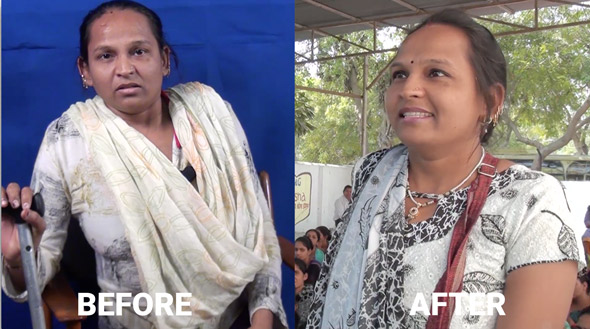
Geeta Rana and her husband are both physically challenged, and they (along with their two children) were once gripped by poverty. Geeta, who has restricted mobility and can not perform any work that requires standing, was provided with a sewing education, free transportation to and from her training, and a sewing machine of her own. She is now able to buy food for her family and provide an education for her children.
Mumtaj
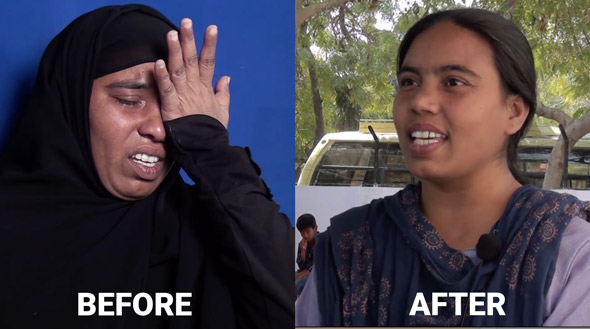
Mumtaj Patel became a widowed mother when her husband, a rickshaw driver, passed away in an accident. After his death, she and her two children faced months of poverty and isolation. When field workers from Project Life heard of her struggle, they convinced her to enroll in vocational training. Now, Mumtaj sews and sells dress materials, and earns enough to provide her children with meals and a proper education.
So, how did they get from qualifying as NEEDY AND MARGINALIZED to EMPOWERED?
Rural Women Deserve Equality
Working with Project Life, Share & Care has trained over 6,000 marginalized women — like Manisha, Geeta, and Mumtaj — who once lived below the poverty line
These and other marginalized women we serve are neglected by their family, often at the expense of their physical and emotional health. Husbands and other family members often resist the offer to help females in the family — due of course to customs and traditions that promote male dominance and patriarchal family structures.
These individuals have allowed us to share their stories in the hope that they’ll not only inspire other women like them, but also appeal to the hearts of generous donors across the world who want to make a positive, lasting difference in others’ lives.
The Enhanced Livelihood Project
Female autonomy continues to be restricted throughout much of India, with cultural resistance particularly prevalent in remote rural communities. To combat inequity, Share & Care partners with local NGOs — such as Saurashtra Medical & Educational Charitable Trust (Project Life) — to provide empowerment and comprehensive livelihood training to rural women in need.
While there are many worthy humanitarian groups working to make a difference in the lives of rural Indian women, we at Share & Care pride ourselves in exercising a unique grassroots approach that focuses on long-term, sustainable solutions. Below are the strategies we use to help women overcome some of the most common cultural, social, and economic barriers to empowerment.
Work locally, with a bottom-up approach.
We partner with highly vetted NGOs working on the ground in rural India. The field workers in these organization are intimately familiar with the areas in which we operate. They know the ins and outs of the local economy, the geographical region, and the traditions and values of its residents. This knowledge enables them to identify individual women in need, and to devise realistic, tailored solutions that will help them become self-reliant.
Empower women with relevant vocational skills.
Each woman in our Enhanced Livelihood Project is provided with 12 weeks of vocational training in one of five skills:
- Sewing
- Embroidery
- Catering
- Computers
- Cosmetology
These are skills that the women can put to use immediately in their own communities, either independently or for employers.
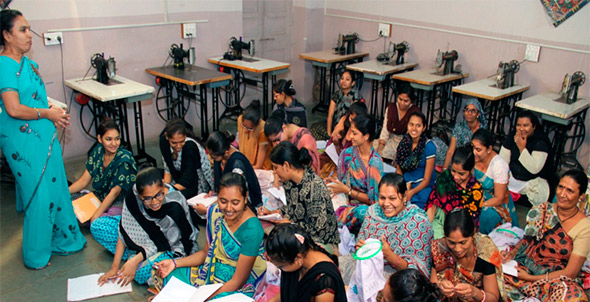
Impart practical, real-world knowledge — such as self-defense and banking training.
During the 12 weeks of training, women also learn valuable skills to help them stay safe and independent on a day-to-day basis. This nonvocational education includes self-defense, personal finance and budgeting training, and gender equality training.
Provide women with the physical tools they need to become self-reliant.
After training, each woman receives a kit with the equipment needed to start making money. For example, women who were trained in sewing receive sewing machines, while those who were trained in catering receive pots, pans, and other cooking essentials.
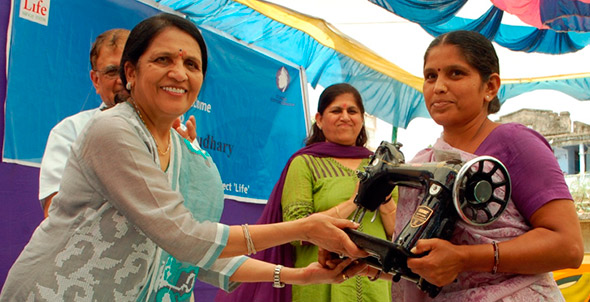
Gain support within the community.
To truly empower women, we must do more than equip them with individual training. We also work closely with members of their communities to combat traditions and cultural norms that promote inequality. (Sometime it is even a challenge to convince the women — most of whom grew up believing they were less important than their male family members — that their voices and independence do indeed matter.) Finally, we connect the women with banks and other relevant businesses willing to support their professional endeavors with employment opportunities or microloans.
Do you want to help empower women? It’s easy. Simply click below to learn more.

